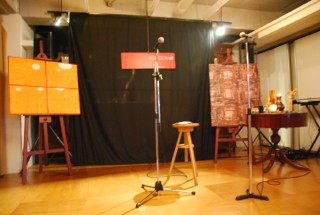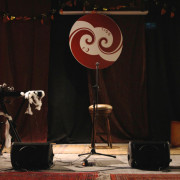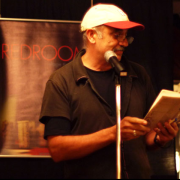Max Farrell, December 2013
Dreamland Pieces, Ch. 05
excerpted from the private journal of Carl Parker, written shortly after one of his exits and returns to the institution
Once I lived in a mansion where almost every wall was lined with portraits of revered ancestors. It was a Maltese family, and most of them looked more than a bit like me; so standing in one end of a corridor and looking across was like looking down a weather-beaten picket fence made out of anachronistic resemblance. Here was the same person, a million times over off into infinity.
I wondered if I was anything like them. I, somewhat hopefully, doubted it, because it was stunning to think anyone that close could have gone through what I was going through without leaving some sort of help, some sort of instruction to future generations. At least a note. I can imagine myself finding such a treasure stashed away somewhere in the miscellaneous artifacts of these past lives. I’ve never found such a thing outside of particularly hopeful dreams, assuming one doesn’t count the contents of more recently deceased relatives’ liquor cabinets.
One summer, during evening rain, I received a waxy envelope from a return address in Rouen, France. As was usual for me, I was incapable of getting the envelope open in the usual way and wound up tearing my way in through two sides. Inside were three dried leaves, two partially disintegrated from the pressures of shipping and one perfectly fine (which i stuck between the two sliding glass doors on my cupboard for luck). There was also a letter, on cream-colored paper, written in dark blue acrylic ink with a fountain pen.
It was from a relative who needed someone to look after their chateau and their six chihuahuas of differing age and temperament (Peter, Mary, Matthew, Paul, Simon and Bart) for two weeks while they honeymooned in Africa. After a few frustrated phone calls — there was no one else to do it, there just wasn’t — and no small amount of sulking I went there, over the sea, on a hot-air balloon basket ride that came up peppered with sharks’ teeth every time it dipped low in the water. Every night I followed a carefully-chosen star to the east, and every day I made my best guesses. On occasion, I consulted a chart or two.
A half-day out to sea a lightning storm came in the night, and so my basket bucked and pitched in the all-encompassing bitter sheet of dense precipitation. Rips and tears bit the sky, lighting up the world for the instant before plunging it back into total darkness. I felt strangely safe in it, as though the storm were a close friend who would never harm me no matter how it might terrorize my neighbors.
At times I almost fooled myself into thinking I would tumble from my little basket as it twisted in the air so as to be perpendicular to the ocean, my little net bags of peaches and bottled water almost lost to the abyss before I caught them by their strings with my brittle fingers and pulled them back to safety, clutching them to my chest for the rest of the night. The book I had been reading (Hemingway’s Old Man and the Sea) was saved only by its soaked first-edition pages sticking to the side of my basket.
The night before closing in on land I encountered another traveler. They were in a much newer model than mine, much more high-tech, bigger and capable of going much faster. It moved skyward with the aid of a perfectly snow-white balloon that looked to be made from that high-tech modern fabric that could keep you afloat if you went down in the sea, deflect bullets, make you coffee and look after your kids. They were far away from me, but it seemed like it would be bad luck to pass another at sea without making some attempt at contact, so I sent a flare off into the sky. It was a pathetic, low-budget sort of signal flare, absolutely the bare minimum to attract the attention of some sort of rescue mission. There was no response, the other traveler just kept moving right on by.I first touched shore in Portugal, and then, taking to the sea again, found myself somehow in Wales — twice — before finally reaching France. After that it was the relatively simple matter of asking the right people for directions to find my way to Rouen. Meeting and interacting with my living relatives always reminds one of an autopsy on a drowned cat that had been, in life, well-loved by the local public. I sorted things out as they needed to be sorted out and served my two weeks looking after the estate. After my relative’s return home, they insisted on buying me a first-class ticket home on an airplane. After much curiosity and interest on my part I found the plane ride home to be completely unremarkable — full of slightly stale air and aging tourists.
Ch.21
James started dedicating his late nights to reading Walter’s notes, in spite of the risk that this might attract the attention of the lurkers or something much worse. He was seeing them more often now, freakishly peripheral visions crossing just out of sight or standing in doorways looking down at him, or worse, just gazing endlessly at something that couldn’t be discerned. James quickly learned that the lurkers would be drawn to the book if he left it anywhere out in the open.
They would gather around it and stare, they would walk past more often, they would turn up nearby. But as he read, what had once unfolded began to bloom in him. As he saw the lurkers more often, he began to understand them the way an infant left alone with a mirror will eventually identify themselves within it.
In antiquity, if you really pissed off the wrong person and that wrong person happened to be the supreme power in the area at the time, they might declare a damnatio memoriae upon you. Eyes might be gouged out of statues and paintings, the faces removed entirely, or the works themselves completely destroyed. People would be forbade from ever mentioning your name again. The Egyptians might have mutilated your cartouche, a little oval with a hieroglyphic writing of your name, and in so doing would have destroyed you — if you had your name written down somewhere, you wouldn’t disappear after you died. Your soul had an anchor.
The first wandering souls were Egyptian in origin. The Egyptians, for a long time, kept the souls of the dead hanging around their temples and tombs by feeding them a constant stream of sacrifices and offerings, which came to dominate and eventually skeletonize their economy. When their diet of willingly provided sustenance was ceased, the deprived spirits of the ancient fallen became hungry and filled the night in their search for other forms of energy. First they would sink to swarming lost blood or urine, things with the remnants of life force still scattered inside or around them, and — eventually — they slowly began to prey on the vitality of those who were left defenseless in the dark.
This is a story that starts a year before the big collapse, when all the bridges burned and it rained brackish water for two years. Carl was getting sick. This was the beginning of the cracks that eventually spread into every aspect of him, creating a solid year of memory gaps and migraines.
He moved into a spare room a friend had in the apartment she shared with her girlfriend. One spent most of her free time hoarding her artistic influences because she was terrified someone else might look at or study them and in so doing make her obsolete, and the other dedicated her significant energy to mixing alcohol with pharmaceutical drugs and taking her clothes off for the internet.
He was fond of them regardless, which is in retrospect kind of self-defeating — something must have already turned off the evolutionarily instinctive common sense that keeps most people safe from people like this. Carl’s sickness got worse, progressively, as maintaining his presence in classes became more troubling and everything started to go downhill. He had started to unravel.
As their behavior became more strange and erratic, Carl was consumed by his affliction. The ailing eye of an ailing storm. His roommates bickered, fought and had tantrums over food. If someone misplaced an orange or cut of meat or if someone cleaned some rotten thing from the back of the fridge, loud words would be had. Carl slept without resting.
“Being here really sucks,” said Tabitha. “I can’t check any of my accounts or commissions. I hope my clients all understand that I’m just indisposed for the time being.”
“That it’s unavoidable?” asked Abel.
Carl interjected. “I’m sick of seeing people who want to be artists or, worse, think they already are, scrounging and fighting for scraps of attention wherever they go. Doesn’t that seem unsophisticated to you?”
“No. It’s just a way to make a living doing something most people can’t.”
“If you want to make art, get a job you can stand then dedicate your free time to your practice. And what makes you think you’re so special?”
“There’s nothing wrong with wanting to be a success,” retorted Tabitha.
“Sip urine, drink blood. Prey on the weak. Whatever scraps you can get your hands on.” said Abel.
When Carl despises something, he won’t acknowledge it. A public persona he thinks is despicable? He won’t talk about them. The ultimate punishment to an entity that is completely and perfectly reliant on attention is refusing them any kind of acknowledgement. This isn’t to say he hasn’t made his share of political actions against the would-be powers he resents — actions, not gestures, the difference between going to a major protest and having an argument with your dad. There’s clearly a modicum of strategy and thought to this, like there is to anything else of worth in the world, the punishment of social icons via personally enforced condemnation of their memory.
Inexorably, this began to evolve to include people who did things that were wrong. A particularly nasty ex-girlfriend, for example — he stripped her of her name, severed all ties, ceased to acknowledge her, and went on with life, missing a few pieces of himself and bleeding from the gut but wiser for it, or at least he would be wiser for it after he clawed and climbed his way out of the pit the whole situation left him in. There’s a story about two frogs that fall in a bucket of cream, but most the time we land somewhere strange, cream isn’t in the picture. When someone helps you into a bad place, damn them out of every cell of your body. These people, they do not exist, they might as well never exist.
Allow their memories to remain. The best way to torment someone is to make off with every scrap of useful information they ever provided and outdo them in whatever areas they believe themselves to excel in. This is what Carl does, the revenge recovery program, punishment through excellence.
The paint on the wall in James and Carl’s room had always been badly cracked. Carl was trying to tape up a charcoal drawing of overlapping hands when a piece of paint fell away. A spot on the wall the size of the palm of your hand was revealed, full of sweeping black strokes of paint. With a little work, a message painted across the entirety of the room’s left wall (facing from the door) revealed itself.
It was a message to someone, anyone, from the deep past. An echo check, measuring signal to noise, and a wish that whoever’s finding this note is doing okay. It was signed with the initials ‘F.H.’.
“Who do you think ‘F.H.’ is?”
“Hook.”
max farrell <seenerie@gmail.com> (c) Copyright 2014 Red Room. Material on this site is the property of contributing members of the Red Room Community. Please do not copy any part of this publication. Thank you.








